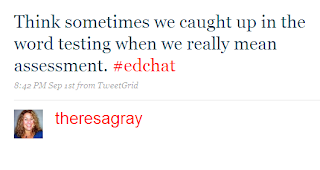 Theresa stated : "Teaching FOR the test and teaching TO the test are two very different things! Don't need a unit name for that!" but she also questioned the terminology, she thinks teachers some times get confused with wordy and take as synonyms the words, evaluation, testing and assessment. The concepts of testing and assessment still today, continue to be considered interchangeable by many, although they have incredibly different definitions and educational values attached to each of them. If we are to promote the clarity of performance in our students and schools, then we likely want to consider being clear in our own word choices.
Theresa stated : "Teaching FOR the test and teaching TO the test are two very different things! Don't need a unit name for that!" but she also questioned the terminology, she thinks teachers some times get confused with wordy and take as synonyms the words, evaluation, testing and assessment. The concepts of testing and assessment still today, continue to be considered interchangeable by many, although they have incredibly different definitions and educational values attached to each of them. If we are to promote the clarity of performance in our students and schools, then we likely want to consider being clear in our own word choices. As some brought to our attention during the #edchat , the topic turned to be more debated that expected, as always, when education community touches the words 'evaluation' and 'tests', everyone sets themselves at ease. Moreover, what exactly do standardized test and assessment mean? And what impact do the use and understanding of these terms have on educational and promotion decision-making?
We had to turn to the The Standards for Educational and Psychological Testing in order to help ourselves about definitions. They define test as "an evaluative device or procedure in which a sample of an examinee's behavior in a specified domain is obtained and subsequently evaluated and scored using a standardized process." While the assessment is defined as "any systematic method of obtaining information from tests and other sources, used to draw inferences about characteristics of people, objects, or programs."
The disenchantment many participants felt that day was evident. They would likely change that way the use and applied standardized test but there is no much they can do, since is the government and test designers who have the last word on decisions of this magnitude. Assessment and testing are part of curriculum, but when designers pay little to any attention to teachers, parents, students and society, there are very few option to improve American schools and education. I am sorry Mr. Duncan.
In a interview conceded to Scholastic, Grant Wiggins considered a guru on the assessment matters, said: "When teachers assess student performance, they're not placing value or judgment on it — that's evaluating or grading. They're simply reporting a student's profile of achievement."
Regarding the teaching FOR/TO the test brought by Gray, he points out:
Many teachers think that they have to teach worse in order for their students to get better scores on standardized tests. Not true. The tests are usually simplistic and generic, so if teachers have a rigorous local curriculum and assessment system, their students should do very well. The test designers aren't interested in teaching through the test — all they're trying to do is find the quickest and easiest way of getting at some basic skills. Teachers' standards should be much higher than the test designers' standards, which are minimal.Teachers work in different ways to create their profiles, develop their own assessment and even evaluate. It is also dependable on what each state allows and directs, but all professional of education need to look besides their classroom, there are not only social and professional responsibilities but legal connotations, as well. It is quite easy to implement and apply standardized tests but requires incredible work to gather evidence of student performance over a period of time to measure learning and understanding, despite all psychological terminology involved.
If you want to receive my future posts regularly for FREE, please subscribe in a reader or by e-mail. Follow me on Twitter. For other concerns, Contact Me at anytime.









0 Comments